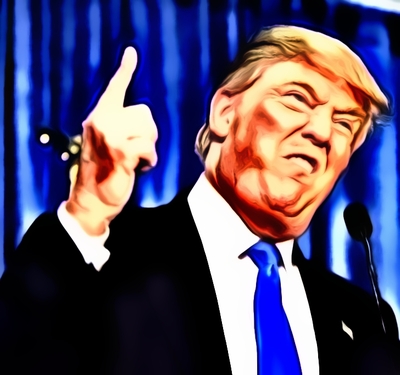
President Donald Trump is again raising the prospect of weakening libel protections for journalists, this time in a Thursday morning tweet in which he complained that the New York Times has "gotten me wrong for two solid years."
Trump tweeted: The failing @nytimes has disgraced the media world. Gotten me wrong for two solid years. Change libel laws?
![]()
On the campaign trail in February 2016, Trump vowed, "I'm going to open up our libel laws, so when they write purposely negative and horrible and false articles, we can sue them and win lots of money." In an October interview with a Miami TV station, he said he would like libel standards in the United States to mirror the less-protective ones in Britain.
Proclamations like these are red meat for Trump's media-hating base, but it is increasingly clear that the president is not serious. How do we know? Two words: Neil Gorsuch.
Let's back up for a moment. The phrase "libel laws," as employed by Trump, is somewhat misleading. What we're really talking about are libel precedents - how courts have interpreted the First Amendment in libel cases.
The Legal Information Institute at Cornell University Law School offers a helpful explanation of where things stand:
Since the U.S. Supreme Court's 1964 decision in New York Times v. Sullivan, defamation claims have been limited by First Amendment concerns. Thus, for instance, public officials and public figures (people who are famous) must show that statements were made with actual malice to recover in an action for defamation.
Actual malice means that a statement was made with knowledge that it was false or with reckless disregard of whether or not it was false. In addition, a plaintiff must show actual malice by "clear and convincing" evidence rather than the usual burden of proof in a civil case, preponderance of the evidence.
![]()
Absent a change to the First Amendment, the way that Trump could weaken libel protections for journalists would be to nominate and successfully install federal judges - Supreme Court justices being most important, obviously - who would undo the precedents set by Times v. Sullivan and lower the bar for people like Trump to "win lots of money."
If Trump were serious about changing libel standards, he probably would not have spent his first Supreme Court nomination on Gorsuch, who appears to have no appetite for reversing Times v. Sullivan. During confirmation hearings last week, Sen. Amy Klobuchar, D-Minn., asked Gorsuch whether he believes "that the First Amendment would permit public officials to sue the media under any standard less demanding than actual malice?"
"That's been the law of the land for, gosh, 50, 60 years," Gorsuch replied. "I could point you to a case in which I've applied it and I think might give you what you're looking for, senator, in terms of comfort about how I apply it: Bustos v. A&E Network."
Gorsuch was referring to a 2011 libel case decided by his federal appeals court. In a favorable ruling for the media, the court determined that a Colorado prisoner named Jerry Lee Bustos could not recover damages from A&E, even though the cable channel had falsely labeled him a member of the Aryan Brotherhood gang. Because Bustos had conspired with the Aryan Brotherhood to smuggle heroin into the prison where he was incarcerated, A&E's description of Bustos was "substantially true," according to the opinion authored by Gorsuch, if not "precisely true."
Trump's latest suggestion that he might "change libel laws" might sound good to his supporters, but it's clear from his Supreme Court pick that it is just talk.
Previously:
• 02/17/17/ Finally an end to 'fake news' stupidity? Newspaper goes to court
• 01/16/17/ He's with her: Trump revives Hillary's idea about kicking media out of White House
• 10/27/16: You won't believe how much Trump made for his media enemies
• 10/23/16: Trump TV already exists. It's called Right Side Broadcasting
• 08/15/16: If Donald Trump ever cleans up his act, Hillary Clinton could have a problem
• 06/06/16: Hillary makes her Second Amendment problem public
• 05/20/16: Lib pundits blame Deb Schultz, not Sanders, for Dems' division
• 05/05/16: Here's what we know about the big Donald Trump-Megyn Kelly interview
• 05/05/16: 12 of the most misguided media predictions about Donald Trump
• 04/28/16: Trump thinks it's time to label him the 'presumptive nominee.' Nope.
• 04/25/16: The 'nasty effect,' and why Donald Trump supporters mistrust the media
• 03/07/16: Even Trump's favorite TV hosts, Scarborough and Bill O', can't avoid feuding with him
• 03/04/16: Mitt Romney: Media darling?
• 03/02/16: Donald Trump: The King of the 'No Comment'
• 02/29/16: Why this new media narrative could actually, for once, hurt Donald Trump
• 02/26/16: Why haven't Trump's tax returns, Clinton's speech gotten the Romney treatment?
• 02/08/16: In media coverage of Chelsea Clinton, the kid gloves are still on


 Contact The Editor
Contact The Editor
 Articles By This Author
Articles By This Author